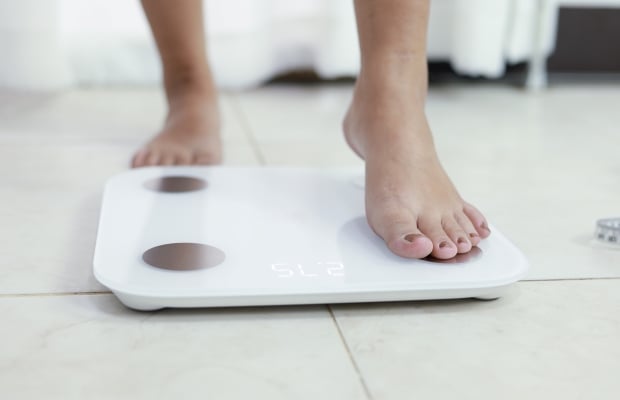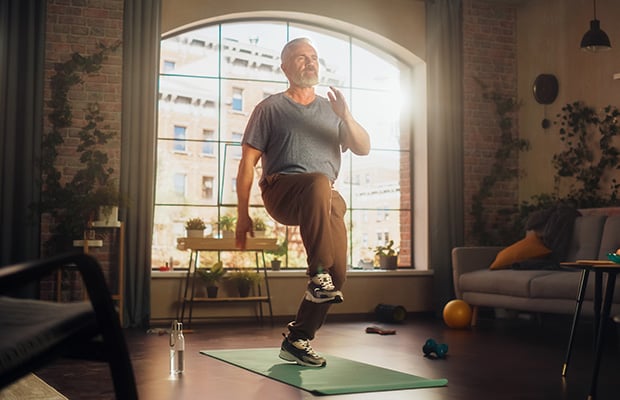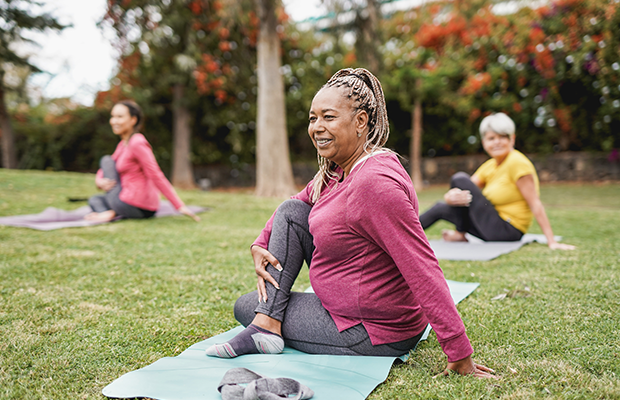When you’re waiting for heart surgery, such as a bypass or valve surgery, we know that a lot of people find the wait really tough. You could feel powerless, anxious, or just ready to get it done. You might have been waiting longer than usual because of the coronavirus outbreak, which can make things feel even harder.
No matter how you feel, and whether or not you have a date for your surgery, there are things that you can do now that could make a big difference. There’s lots of research to show that doing these things could help you get home from hospital sooner and make a better recovery after your surgery.
Jump straight to:
1. Look after your mental health

How are you feeling? Common things that people tell us while they are waiting for surgery include “I feel overwhelmed”, “I’m anxious I’ll get coronavirus in hospital” or “my surgery keeps getting rescheduled and I feel powerless”. It’s normal to feel worried.
If you can do one or two things to reduce your stress and worry that will really help you. What from the list below could you try today?
- Improve your mood by doing something active – such as going for a walk, a bike ride or even some gardening. See our top tips for winter gardening. If you're keeping inside during the cold weather then try our 10 minute living room workout or some strength and flexibility exercises
- Distract yourself with something you need to really focus on, such as a craft, DIY, crossword or jigsaw. Even a temporary break from negative thoughts could help you feel better.
- Try meditation or some light yoga.
- Talk to your family and friends about how you’re feeling.
- Get support from the BHF. Whether you need practical advice or a sympathetic ear, we’re here for you. Our Heart Helpline can provide you with information and support on anything heart-related. Or join our online community to talk to other people in similar situations, and read other people’s experiences and tips for living with heart and circulatory disease.
- Get support from another organisation. Anxiety UK helpline is 08444 775774 (open 9.30am to 5.30pm, Monday to Friday), and Mind Infoline can offer support with mental health problems and treatments. Call 0300 123 3393 or email Mind.
2. Move a bit more
Getting active before surgery will benefit most people. This is because your heart and lungs will have to work harder after an operation to help your body to heal. Regular exercise makes your heart and lungs stronger, so they’ll be in the best possible shape to help you heal.
In a study at McMaster University, Canada, people waiting for bypass surgery exercised twice a week in the run-up to the operation. They did a warm-up, around 30 minutes of aerobic activity such as cycling or brisk walking, and a cool-down. They spent on average one day less in hospital than those who hadn’t done the exercise programme, and, six months after surgery, reported better quality of life.
Similarly, in a study run by King’s College Hospital, London, people over 65 waiting for bypass or valve surgery did at-home balance and strengthening exercises. They were encouraged to keep a home exercise diary and during telephone consultations, they would be encouraged, and praised for their efforts. The research found they were fitter and less frail on average after the surgery than the comparison group. You could try your own exercise programme – have you ever thought of keeping an exercise diary as well as asking someone to encourage you for your efforts?
- Anyone can get more active. Even if you can’t exercise standing up there are things you can do. Find out how you can safely get more active before your surgery.
- Try an app on your phone to help you set goals and track your progress, such as ‘Active 10 walking tracker’ and ‘Couch to 5K’.
- A lot of people find they’re more motivated when they exercise with other people and love the support and encouragement it brings. Could you do a weekly walk with a friend or loved one, or join an online class together?
Want to get fit and healthy?
Sign up to our fortnightly Heart Matters newsletter to receive healthy recipes, new activity ideas, and expert tips for managing your health. Joining is free and takes two minutes.
I’d like to sign-up
3. Eat the right things

When you're about to have surgery, your diet may be the furthest thing from your mind. But what you eat before your procedure may help you recover faster. Improving your diet before your surgery improves immune health, reduces your risk of infection, provides your body with the nutrients it needs for tissue healing, and may help you get home from the hospital faster.
While you’re waiting for surgery, focus on eating a healthy balanced diet filled with a variety of foods from all the food groups. By doing this, you’ll get all the nutrients that support healing and fight off infection.
The best things to eat before surgery include:
- Healthy proteins, such as fish, chicken, eggs, beans, soy, tofu, nuts, lean red meat
- Grains, such as whole-wheat bread, brown rice, brown pasta, quinoa
- Fruit and vegetables - at least 5 portions a day
- Dairy, low-fat milk, cheese and yoghurt, or fortified plant-milk alternatives
- Healthy fats, such as olive oil, avocado, nuts, seeds
You may need to make a few changes to your diet as you get closer to the date of your surgery. You will be given specific instructions on what you need to do at your pre-operative assessment.
4. Manage your weight

One way to improve your recovery after surgery is to make sure you’re a healthy weight before the surgery. Once you know your weight you can check your BMI and see if you’re underweight, a healthy weight or overweight.
Being overweight increases the risk of complications during surgery, such as breathing problems, blood clots, infections, slower recovery and longer hospital stays. So you may be advised to lose weight before the surgery. For most people, losing even a little weight before the operation will help reduce your risk of complications.
For many people who are struggling to lost weight, changing their portion sizes makes all the difference.
Being underweight can also increase risks from surgery and slow down the rate at which you recover. If you’ve been poorly then you may have lost your appetite and lost weight, and your body might not be getting the calories and nutrients it needs. If this is the case, your GP may have referred you to a dietitian; if not then you can ask them to. They could advise a special diet or supplements to make sure you’re still getting what you need before your surgery.
5. Take your medication
It's always important to take any heart medication you’re prescribed, but if you’re waiting for surgery, it’s more important than ever. Heart medications will help keep your condition under control whilst you’re waiting for surgery, so that you feel better during the waiting period. And they reduce the risk of you having a serious event that could mean that your surgery can’t go ahead.
Before you have surgery you may need to stop some medication such as blood thinners, but you will be given advice if you need to do this - don't stop your medication without advice from your health professionals.
Back to top











